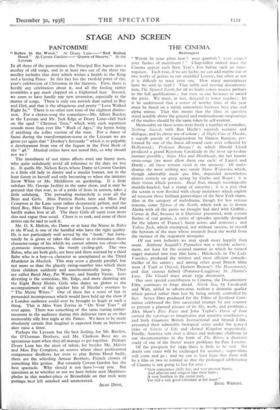STAGE AND SCREEN
PANTOMIME
"Babes in Hood." Lyceum IN all three of the pantomimes the Principal Boy bursts into a medley of old songs, and in at least two out of the three the medley includes that ditty which wishes a health to the King and a lasting Peace. In this fact lies the twofold point of this year's celebration of Christmas in the theatres. First, there is hardly any celebration about it, and all the fooling rather resembles a gay mask clapped on a frightened face. Second, we seem to have hardly any new invention, especially in the matter of songs. There is only one newish duet suited to Boy and Girl, and that is the ubiquitous and pretty "Love Walked Right In." There is no other new tune of the slightest distinc- tion. For a chorus-song the comedians—Mr. Albert Burdon at the Lyceum and Mr. Jack Edge at Drury Lane—fall back on the aged "Chestnut Tree," which with each repetition sounds more than ever like "Rock of Ages," the hymn being if anything the jollier version of the tune. For a dance of fauns during the transformation-scene at the Lyceum we are given yet again that " Donkey's Serenade " which is so palpably a development from one of the fugues in the First Book of the "48." Musical critics have not noted this, so why should not we ?
The moodiness of our times affects even our funny men, who quite sedulously avoid all reference to the days we live in. It quells Mr. Nelson Keys, whose Dame at Covent Garden is a little old lady in dimity and a muslin bonnet, not in the least funny in herself and only becoming so when she imitates Snow White or Mr. Middleton on gardening. It a little subdues Mr. George Jackley in the same show, and it may be granted that that roar, as of a pride of lions in unison, takes a little subduing. The pervading melancholy is over all the Boys and Girls. Miss Patricia Burke here and Miss Fay Compton at the Lane seem rather desperately gallant, and the third Boy, Miss Nancy Fraser at the Lyceum, is wistful and hardly makes love at all. The three Girls all seem even more dim and vague than usual. Cheer is to seek, and none of these artists can be said to seek it.
Mr. G. S. Melvin, the Dame or at least the Nurse in Babes in the Wood, is one of the handful who have the right quality.
He is not particularly well served by the "book," but fortu- nately he is given or takes the chance to re-introduce those character-songs of his which we cannot admire too often—the gymnastic instructress, the weedy cycling-girl. The two Babes, who are both girls, are here and there assisted by a third Babe who is a boy—a character as unexplained as the Third Murderer in Macbeth. This may seem a ghastly parallel, but not more so than the ghastly swing-number into which these three children suddenly and anachronistically jump. They are called Beryl May, Pat Warner, and Stanley Vassie. Less diverting is the comedian, Mr. Edge, and more diverting are the Eight Betty Hobbs Girls who dance on globes to the accompaniment of the quicker bits of Nicolai's overture to "The Merry Wives." One of these has a sense of fun in pretended incompetence which would have held up the show if a London audience could ever be brought to laugh at such a thing. This is Miss Vera Zorina in "On Your Toes" all over again. There was something of the same staring embar- rassment in the audience during this delicious turn as on that memorably silly first night at the Palace. We have to be made absolutely certain that laughter is expected from us before we dare raise a titter.
Perhaps the Lyceum has the best fooling, for Mr. Burdon, the O'Gorman Brothers, and Mr. Clarkson Rose arc an uproarious team when they all manage to get together. Perhaps Drury Lane has the most of talent, for besides Mr. Melvin and Miss Fay Compton, an actress whose sheer professional competence disallows her even to play Robin Hood badly, there are the whistling Arnaut Brothers, French clowns of something like genius. But certainly Covent Garden has the best spectacle. Why should it not have ?—say you. But questions as to whether or not we have before seen Mephisto- pheles in this market-place or BrCumhilde on that rock were
perhaps best left unasked and unanswered. ALAN DENT.


































 Previous page
Previous page